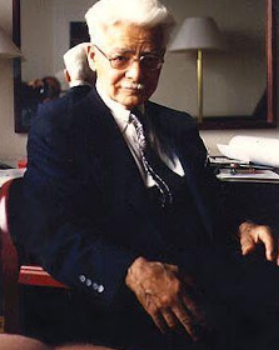Luigi di Bella
Italian medical doctor and biologist
Luigi di Bella (1912–2003) was an Italian medical doctor and biologist known for developing the controversial Di Bella therapy, an alternative treatment for cancer. His work sparked significant debate in the medical community and among the public.
Early Life and Education[edit | edit source]
Luigi di Bella was born on 17 July 1912 in Sicily, Italy. He pursued his medical studies at the University of Modena and Reggio Emilia, where he later became a professor. Di Bella specialized in physiology and biochemistry, fields in which he conducted extensive research throughout his career.
Career[edit | edit source]
Di Bella's career was primarily focused on teaching and research. He held a professorship at the University of Modena and Reggio Emilia, where he taught physiology. His research interests included the study of neurotransmitters and endocrinology.
Research and Contributions[edit | edit source]
Di Bella's most notable contribution to medicine was the development of the Di Bella therapy, a treatment regimen that he claimed could treat cancer. The therapy involved a combination of somatostatin, melatonin, vitamins, and other substances. Despite his claims, the therapy was met with skepticism by the mainstream medical community due to a lack of scientific evidence supporting its efficacy.
Di Bella Therapy[edit | edit source]
The Di Bella therapy gained significant attention in the late 1990s when patients and media in Italy began advocating for its use. The Italian government eventually conducted clinical trials to assess the therapy's effectiveness. The trials concluded that the therapy was not effective in treating cancer, leading to its rejection by the medical community.
Controversy and Public Reaction[edit | edit source]
The controversy surrounding the Di Bella therapy highlighted the tension between alternative medicine and conventional medical practices. Supporters of Di Bella argued that his treatment offered hope to patients with terminal cancer, while critics emphasized the importance of evidence-based medicine.
Legacy[edit | edit source]
Despite the controversy, Luigi di Bella remains a notable figure in the history of alternative cancer treatments. His work continues to be a topic of discussion in debates about the role of alternative therapies in modern medicine.
Related pages[edit | edit source]
Search WikiMD
Ad.Tired of being Overweight? Try W8MD's physician weight loss program.
Semaglutide (Ozempic / Wegovy and Tirzepatide (Mounjaro / Zepbound) available.
Advertise on WikiMD
|
WikiMD's Wellness Encyclopedia |
| Let Food Be Thy Medicine Medicine Thy Food - Hippocrates |
Translate this page: - East Asian
中文,
日本,
한국어,
South Asian
हिन्दी,
தமிழ்,
తెలుగు,
Urdu,
ಕನ್ನಡ,
Southeast Asian
Indonesian,
Vietnamese,
Thai,
မြန်မာဘာသာ,
বাংলা
European
español,
Deutsch,
français,
Greek,
português do Brasil,
polski,
română,
русский,
Nederlands,
norsk,
svenska,
suomi,
Italian
Middle Eastern & African
عربى,
Turkish,
Persian,
Hebrew,
Afrikaans,
isiZulu,
Kiswahili,
Other
Bulgarian,
Hungarian,
Czech,
Swedish,
മലയാളം,
मराठी,
ਪੰਜਾਬੀ,
ગુજરાતી,
Portuguese,
Ukrainian
Medical Disclaimer: WikiMD is not a substitute for professional medical advice. The information on WikiMD is provided as an information resource only, may be incorrect, outdated or misleading, and is not to be used or relied on for any diagnostic or treatment purposes. Please consult your health care provider before making any healthcare decisions or for guidance about a specific medical condition. WikiMD expressly disclaims responsibility, and shall have no liability, for any damages, loss, injury, or liability whatsoever suffered as a result of your reliance on the information contained in this site. By visiting this site you agree to the foregoing terms and conditions, which may from time to time be changed or supplemented by WikiMD. If you do not agree to the foregoing terms and conditions, you should not enter or use this site. See full disclaimer.
Credits:Most images are courtesy of Wikimedia commons, and templates, categories Wikipedia, licensed under CC BY SA or similar.
Contributors: Prab R. Tumpati, MD

